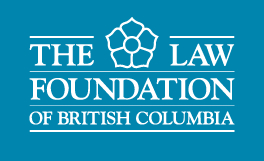In 2016, the Law Foundation of British Columbia’s Board of Governors and staff reviewed the final report of the Truth and Reconciliation Commission of Canada and considered its options in terms of advancing the recommendations that were made in the report.
In November, 2016, the Law Foundation’s Truth and Reconciliation Implementation Plan was approved as follows:
- The Law Foundation should include projects that advance the process of reconciliation with Canada’s Indigenous people as an area of interest in its Project Funding Notice.
- The Law Foundation’s commitment to supporting programs and projects that advance the process of reconciliation should be included as part of the discussion at site visits with Law Foundation funded programs.
- Cultural competency training should be a required element for every Law Foundation funded advocate.
- The Law Foundation should encourage cultural competency training for law students and lawyers.
- Cultural competency training within law schools should be assessed and encouraged.
- The Children’s Lawyer Initiative should include consideration of:
-
- The effects of intergenerational trauma in the residential school system on clients likely to be served by the Children’s Lawyer,
- the importance of maintaining statistics of the number of Indigenous children served, and
- the importance of evaluating the Children’s Lawyer’s effectiveness in implementing a culturally appropriate approach to its representation of children
- Over time, consider support for the education of social workers, lawyers, and judges about the history residential schools, their impact on children and their caregivers, and the potential for Indigenous communities and families to provide more appropriate solutions to family healing.
- The Law Foundation and its grantees should investigate the unique needs of Indigenous people living on reserve.
- The Law Foundation should consult with the courts, the Legal Services Society, Indigenous communities, and other stakeholders to identify ways in which the Law Foundation can contribute to the implementation of First Nations courts in British Columbia.
- The Law Foundation Fellowships and Research Committee should consider research priorities that support the Truth and Reconciliation Report and its Calls to Action.
- The Law Foundation, in the future, should consider the possibility of:
-
- funding a network of Indigenous legal advocates;
- funding ‘train the trainer’ activities for advocates to develop skills in delivering education to Indigenous people about the unique legal needs they face in their communities;
- funding initiatives that promote Gladue principles and support the preparation of Gladue reports; and
- funding initiatives that respond to the over-representation of Indigenous people in custody.
- The Law Foundation should consider funding the following projects should it be approached to do so:
-
- public legal education initiatives that advance Indigenous peoples’ understanding of the justice system;
- legal research projects to develop or evaluate law school curricula that meets the requirements set out in Recommendation 28 of the Calls to Action;
- legal research/law reform projects that explore and advance Aboriginal justice systems in a manner consistent with the Treaty and Aboriginal rights of Aboriginal people, the Constitution Act, 1982, and the United Nations Declaration on the Rights of Indigenous Peoples, endorsed by Canada in November 2012;
- projects reporting on Indigenous versus non-Indigenous children in care, reasons for apprehension, spending on preventative and care services by child-welfare agencies, and effectiveness of various interventions;
- law reform projects aimed towards developing (or legal research projects aimed towards researching) child-welfare legislation that establishes national standards for Indigenous child apprehension and custody cases;
- legal research projects assessing progress towards the elimination of over-representation of Indigenous people in custody over the next decade; and
- law reform/legal research projects aimed towards developing new Aboriginal education legislation (per the Commission’s Recommendation 10) with the full participation and informed consent of Aboriginal peoples.
